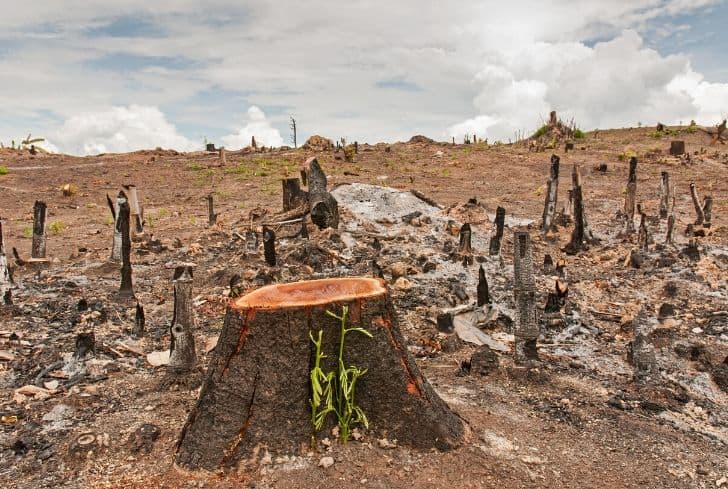Nigeria lost size of Lagos, Enugu, FCT to deforestation in 20 years –Report
Nigeria has lost 17,400Km2 in the last two decades from the year 2000 to 2020 to deforestation, a study has revealed. The volume is the size of Lagos (3,577km2), Enugu (7,161km2) and the Federal Capital Territory (7,315km2) combined. The report established that Nigeria was fast losing animals and plants species in its forests in the […]

Deforestation
Nigeria has lost 17,400Km2 in the last two decades from the year 2000 to 2020 to deforestation, a study has revealed.
The volume is the size of Lagos (3,577km2), Enugu (7,161km2) and the Federal Capital Territory (7,315km2) combined.
The report established that Nigeria was fast losing animals and plants species in its forests in the last two decades due to deforestation.
This was revealed by the Dean Faculty of Earth and Environmental Sciences, Bayero University Kano and Project Lead Nigeria Professor Aliyu Salisu Barau, at the Final Workshop of Research Project on “Improving Access to Clean and Modern Energy for Cooking while Reducing Land Degradation and Biodiversity Loss in Nigeria” held in Abuja on Monday.
Malaria: Kano records 62 deaths in 3 months
NFF appoints Finidi George as Super Eagles coach
According to him, they conducted the study in three states in collaboration with Bayero University Kano (BUK), University of York and University College London sponsored by The Royal Society in two states, Kaduna, Nasarawa and the Federal Capital Territory (FCT) for over three years.
He stated that the study explored major deforestation hotspots for wood fuel, Charcoal production and how they have changed the landscape and forests since the year 2000.
He said, “Our study has estimated that the forest loss between 2000 and 2020 across the three states stands at 17,400km2 which is approximately five-times the size of Lagos State.
“This finding resonates with the UN estimates that ranks Nigeria among top-3 states with the highest rates of deforestation.
“In the two states and rural and semi urban parts of the FCT, 94.4% of households use fuelwood or charcoal for cooking. Interestingly, 95.8% said they would use cleaner fuels should they be available and affordable.
“The cost of ignoring the local communities is too expensive for the future of this country’s ecological integrity and wellbeing. In the course of this project, we have listened to the people living near forests and their perceptions on conservation is very discouraging”.
In his remarks, Chairman on the occasion and Vice Chancellor, Bayero University Kano (BUK), Professor S.A Abbas said, the University was ready to partner with National and international partners in projects that will ensure environmental sustainability to address critical environmental challenges.
According to him, BUK has attracted mult-billion Naira research grants from various local and international partners to undertake various researches to proffer solutions to various environmental challenges.
He said the research conducted shows the importance of universities in driving researches and collaborative efforts on sustainability in environment, education, engineering, agriculture and other areas.
On his part, the Emir of Nasarawa, who is also a former minister of environment, Alhaji Ibrahim Usman Jibrin said, Environment has gradually taken center stage in world affairs in the last six decades or more.
He advised that everybody must be involved in utilising available materials for producing and utilising clean energy.
Professor Lindsay Stringer of York University who joined the meeting through Zoom commended the persons and institutions involved in the study for their commitment to bring out issues that affects the environment through uncontrolled human activities.
On his part, the Director, Climate Change Department, Ministry of Environment, Friday Onah who represented the Minister said, the federal government has put in place policies that will ensure environmental sustainability and provision of clean energy inline with its energy transition drive.
